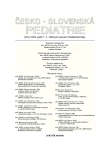-
Medical journals
- Career
Alpha-1-antitrypsin Deficiency
Authors: P. Konečná 1; D. Procházková 1; L. Kozák 2; M. Hanáková 2; H. Vinohradská 3; H. Hrstková 1
Authors‘ workplace: 1. dětská interní klinika FN Brno přednostka prof. MUDr. H. Hrstková, CSc. 1; Centrum molekulární biologie a genové terapie IHOK FN Brno přednosta prof. MUDr. J. Vorlíček, CSc. 2; Oddělení klinické biochemie FN Brno primář doc. MUDr. M. Dastych, CSc. 3
Published in: Čes-slov Pediat 2005; 60 (10): 558-563.
Category: Original Papers
Overview
The authors describe patients prospectively examined from 1998 to 2003, who had reduced level of alpha-1-antitrypsin detected during screening in the former South-Moravian region. The aim of the study was to determine the relation between incidence, intensity and progression of liver damage in children with alpha-1-antitrypsin deficiency. A total of 197 probands were examined. DNA analysis confirmed the PiZZ genotype in 22 patients, 10 children had the PiSZ genotype and 10 had the PiMS genotype. Most of the examined probands had the PiMZ genotype. The results indicate that the highest risk group were patients with the PiZZ genotype. The homozygotes with the PiZZ genotype predispose to early liver affection in childhood and to the origin of the panacinary emphysema in adults. Due to the severity of the clinical manifestations and the cost of screening examinations, the authors recommend that screening of alpha-1-antitrypsin deficiency to continue.
Key words:
screening, alpha-1-antitrypsin, genotype
Labels
Neonatology Paediatrics General practitioner for children and adolescents
Article was published inCzech-Slovak Pediatrics

2005 Issue 10
Most read in this issue- Alpha-1-antitrypsin Deficiency
- Schonlein-Henoch Nephritis – Peculiarities of Clinical Course
- Contribution of Static Renal Scintigraphy Using Pinhole Collimator in Childhood
Login#ADS_BOTTOM_SCRIPTS#Forgotten passwordEnter the email address that you registered with. We will send you instructions on how to set a new password.
- Career

